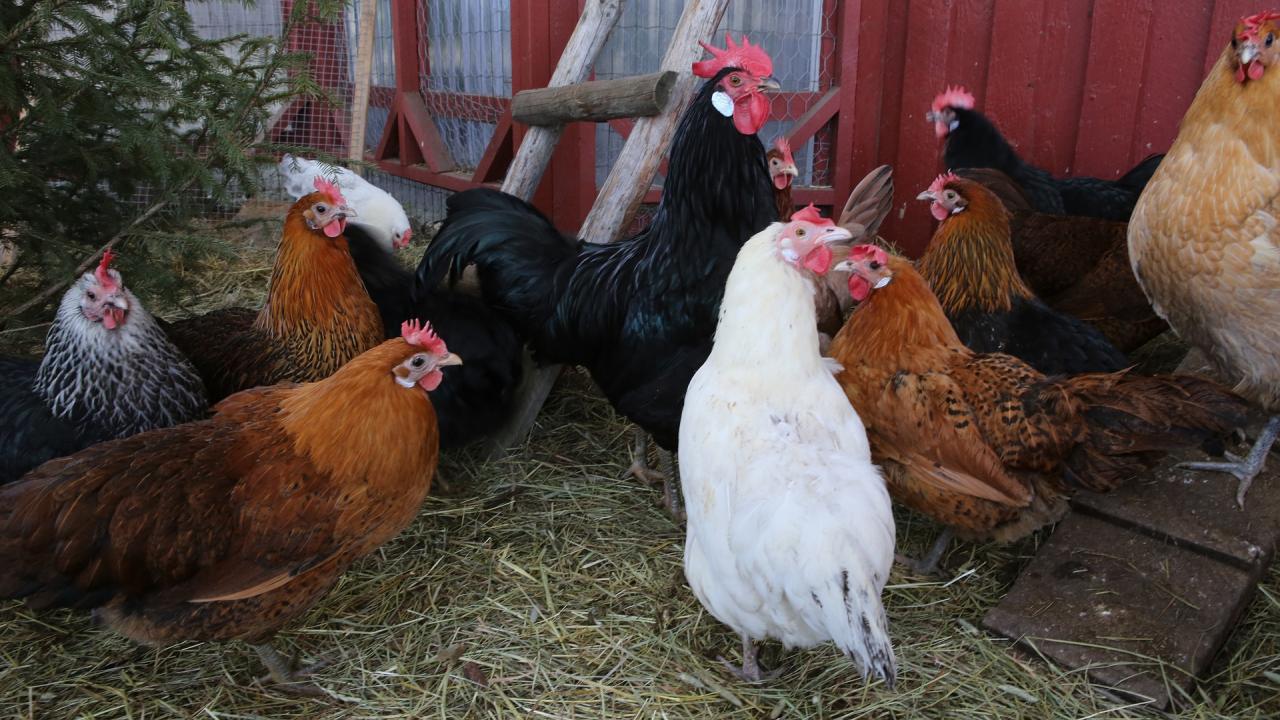
Virulent Newcastle Disease (VND)
What is virulent Newcastle disease?
Takeaways
- Virulent Newcastle disease (VND) is a viral disease that can cause severe neurologic, respiratory, and gastrointestinal issues.
- It is a highly contagious, fatal disease in birds, especially chickens.
- It is a reportable disease. Cases must be reported to the California Department of Food and Agriculture (CDFA) within 24 hours.
- Proper biosecurity measures are essential to disease prevention.
- It is not a food safety issue. No human cases have resulted from eating poultry products.
Virulent Newcastle disease (VND), formerly known as exotic Newcastle disease, is an extremely harmful (virulent) strain of the Newcastle disease virus that can cause severe neurologic, respiratory, and gastrointestinal issues. A highly contagious, fatal disease in birds, it is one of the most serious diseases of chickens worldwide.
The virus spreads in respiratory droplets and feces through bird-to-bird contact, by people, and on contaminated clothing or equipment. Chickens are very susceptible, whereas ducks and geese are moderately resistant. Parrots, especially Amazon parrots, can shed the virus intermittently, sometimes for more than a year. Turkeys typically do not develop severe signs.
There are also two other types of Newcastle disease virus (NDV). Mesogenic NDV is a milder version associated with mortality in young chicks. Lentogenic NDV results in mild respiratory infections, available vaccines are usually of this type.
Virulent Newcastle disease is a reportable disease. Cases must be reported to the California Department of Food and Agriculture (CDFA) within 24 hours of diagnosis. It is not a food safety concern; no human cases have been reported as a result of consumption of poultry products. People that have had close contact with infected birds or work with the virus in laboratory settings may develop eye inflammation (conjunctivitis) and flu-like symptoms.
What are the clinical signs of virulent Newcastle disease?
The clinical signs of VND include inactivity, depression, coughing, sneezing, respiratory distress, nasal discharge, swollen eyelids, diarrhea, drooping wings, and reduced egg production. Affected birds will sometimes separate themselves from the flock. Neurological signs of VND include twisting of the head and neck, circling, paralysis, and muscle tremors. Neurological signs usually occur after the previously mentioned signs.
How is virulent Newcastle disease diagnosed?
Swabs are taken from sick birds for molecular detection (PCR). Virus isolation and antibody testing can also be used for virus detection and antibody detection, respectively.
How is virulent Newcastle disease treated?
There is no cure for virulent Newcastle disease. During an outbreak, depopulating flocks is the only effective way to eliminate the virus.
What is the prognosis for virulent Newcastle disease?
Virulent Newcastle disease can cause high rates of sickness (close to 100%) and death in naïve birds. Mortality can be 80-100% in non-vaccinated flocks. Recovered birds can continue to show neurologic signs.
How can virulent Newcastle disease be prevented?
Virulent Newcastle disease can be prevented through good management and proper biosecurity measures. These include:
- Ensuring that staff wash their hands before and after entering bird areas.
- Wearing dedicated shoes and clothing to care for birds. These should not be worn in other areas.
- Thoroughly cleaning and disinfecting equipment (including vehicle tires) before removal from the property.
- Not borrowing used poultry equipment.
- Keeping feeders and waterers clean.
- Restricting flock movement and limiting contact with wild birds.
- Promptly quarantining any suspected cases.
Vaccination may be warranted when flocks are in close contact with waterfowl, located in endemic zones, or when outbreaks are happening in the same geographical area. A vaccine is administered in the form of eye drops individually and must be given at least twice per year. It is important to note that vaccination does not mean that birds will not get VND, but clinical signs are usually less severe in vaccinated animals. Proper biosecurity measures must be maintained, even if the flock has been vaccinated.
For more information:
How to Protect Birds and Prevent Virulent Newcastle Disease: A Guide for Backyard Poultry Owners - UC Davis School of Veterinary Medicine:
CDFA Virulent Newcastle Disease
Backyard Poultry Submission Guidelines, California Animal Health and Food Safety Laboratories (CAHFS)
Poultry Health, UC Davis School of Veterinary Medicine
“Poultry Pestilence Prompts Vigilance in Bay Area”, UC Davis School of Veterinary Medicine
“Virulent Newcastle Disease Outbreak Threatens Poultry”, UC Davis School of Veterinary Medicine
“Backyard Chickens are Dying in Droves in Southern California”, UC Davis School of Veterinary Medicine
*This article may not be reproduced without the written consent of the UC Davis School of Veterinary Medicine.
